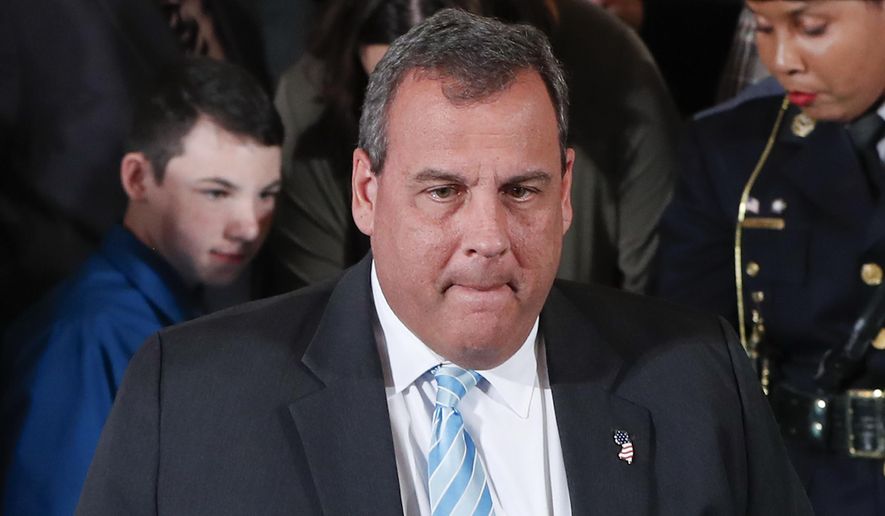OPINION:
Voters in New Jersey and elsewhere just sent a message to President Trump and congressional Republicans: Deliver or expect to get replaced, and planned tax cuts will hardly be enough.
Gov. Chris Christie, a tough former U.S. attorney for New Jersey, was elected to drain the swamp in Trenton and resurrect the state’s moribund economy, but he did not deliver. Despite a few notable reforms — such as raising the retirement age for new public employees — the state’s finances remain shaky, and its taxes are among the highest even in the tax-heavy Northeast.
No surprise: Economic growth since he took office has only been about half the pace of the rest of the nation. After investing considerable energy running for a Republican presidential nomination he had little chance of winning, and his staff jammed traffic on the George Washington Bridge to take revenge on a mayor who did not endorse Mr. Christie for re-election, voters handed Democrat Phil Murphy the keys to the governor’s mansion in a landslide.
Similarly, Mr. Trump and Republican leaders in Congress promised to straighten out health care, cut taxes, rebuild the nation’s infrastructure and boost economic growth. All of these are interconnected — and so far the Republicans’ performance is less than encouraging.
With entitlements taking about 60 percent of the federal budget and on track to consume all federal tax revenues within a decade, nothing truly meaningful can be done about personal income taxes without tackling abuses of Medicaid, food stamps, Section 8 housing subsidies and Social Security disability benefits.
Washington simply can’t add much more to the annual deficit than the $150 billion the congressional budget resolution slates for both corporate and personal tax cuts. Even with some revenue payback for lower taxes through stronger growth, entitlements are on track to consume all federal revenue within a decade. And the accumulated national debt as a percentage of gross domestic product (GDP) will reach the threshold that has caused investors to flee other nations’ bonds and pushed their finances into crisis.
Already, investors no longer accept lower interest rates in exchange for the extra security that U.S. bonds once offered. The bond market now views long-term U.S. Treasuries as more risky and has effectively downgraded U.S. sovereign debt.
Replacing Obamacare and nixing Medicaid benefits to able-bodied adults without small children was to be the first installment of entitlement reform and to help finance large tax cuts, but the Republican Senate blinked.
After all, indolent 35-year-olds, who waste their lives playing video games, vote. Now too little money is available to both make U.S. corporate taxes internationally competitive and accomplish an attractive package of personal income tax cuts and reforms.
Next up is infrastructure, but potential sources of financing are beyond reach. The Republican Party has an allergic reaction to asking folks who use the roads to pay for them with higher gas taxes.
For years, we have heard proposals to tax the profits of U.S. corporations held on the books of offshore subsidiaries. Unfortunately, that money is being used in the House tax bill to help finance the proposed corporate tax cuts, and now it is not clear how rebuilding America can be financed without taking on even more federal debt.
The Trump administration has pushed the idea of private-public partnerships to rebuild roads, bridges, airports and public utilities but recent experiments with such schemes too often have gone badly — price-gouging, bankruptcies and life-threatening wait times for ambulances.
The proposed corporate and personal tax cuts come to only three-quarters of 1 percent of GDP a year and will give the economy no more than a moderate boost. Any gains to family incomes from lower taxes and higher wages can be expected to be mostly overwhelmed by rising health care costs, especially for those who don’t qualify for big federal subsidies.
The GOP has promised better days and when they don’t deliver, voters may be expected to respond in predictable ways.
Ask Mr. Christie — he exits with an approval rating that is lowest among state governors and about half that of Mr. Trump’s uninspiring score.
Now he will be succeeded by a governor with a progressive agenda that includes a millionaire’s surtax, a single-payer health system and a $15-an-hour minimum wage.
• Peter Morici is an economist and business professor at the University of Maryland, and a national columnist.




Please read our comment policy before commenting.